Related Research Articles

Lesbian, gay, bisexual, transgender and queer (LGBTQ) movements are social movements that advocate for LGBTQ people in society. Although there is not a primary or an overarching central organization that represents all LGBTQ people and their interests, numerous LGBTQ rights organizations are active worldwide. The first organization to promote LGBTQ rights was the Scientific-Humanitarian Committee, founded in 1897 in Berlin.

Queer is an umbrella term for people who are not heterosexual or are not cisgender. Originally meaning 'strange' or 'peculiar', queer came to be used pejoratively against LGBT people in the late 19th century. From the late 1980s, queer activists began to reclaim the word as a neutral or positive self-description.

Sexuality and gender identity-based cultures are subcultures and communities composed of people who have shared experiences, backgrounds, or interests due to common sexual or gender identities. Among the first to argue that members of sexual minorities can also constitute cultural minorities were Adolf Brand, Magnus Hirschfeld, and Leontine Sagan in Germany. These pioneers were later followed by the Mattachine Society and the Daughters of Bilitis in the United States.
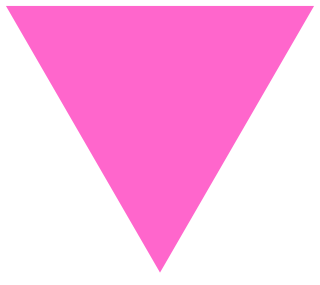
A pink triangle has been a symbol for the LGBT community, initially intended as a badge of shame, but later reappropriated as a positive symbol of self-identity. In Nazi Germany in the 1930s and 1940s, it began as one of the Nazi concentration camp badges, distinguishing those imprisoned because they had been identified by authorities as gay men or trans women. In the 1970s, it was revived as a symbol of protest against homophobia, and has since been adopted by the larger LGBT community as a popular symbol of LGBT pride and the LGBT movements and queer liberation movements.

Magnus Hirschfeld was a German physician, sexologist and LGBTQ advocate, whose citizenship was later revoked by the Nazi government. Hirschfeld was educated in philosophy, philology and medicine. An outspoken advocate for sexual minorities, Hirschfeld founded the Scientific-Humanitarian Committee and World League for Sexual Reform. He based his practice in Berlin-Charlottenburg during the Weimar period. Performance Studies and Rhetoric Professor Dustin Goltz characterized the committee as having carried out "the first advocacy for homosexual and transgender rights".

Queer Eye is an American reality television series that premiered on the Bravo network in July 2003, initially broadcast as Queer Eye for the Straight Guy. The series was created by executive producers David Collins and Michael Williams along with David Metzler through their company, Scout Productions. Each episode features a team of gay professionals in the fields of fashion, personal grooming, interior design, entertaining, and culture collectively known as the "Fab Five" performing a makeover : revamping wardrobe, redecorating, and offering lifestyle advice.

Gay men are male homosexuals. Some bisexual and homoromantic men may dually identify as gay and a number of gay men also identify as queer. Historic terminology for gay men has included inverts and uranians.

LGBTQ history dates back to the first recorded instances of same-sex love, diverse gender identities, and sexualities in ancient civilizations, involving the history of lesbian, gay, bisexual, transgender, and queer (LGBTQ) peoples and cultures around the world. What survives after many centuries of persecution—resulting in shame, suppression, and secrecy—has only in more recent decades been pursued and interwoven into more mainstream historical narratives.
Gay-for-pay describes male or female actors, pornographic stars, or sex workers who identify as heterosexual but who are paid to act or perform as homosexual professionally. The term has also applied to other professions and even companies trying to appeal to a gay demographic. The stigma of being gay or labeled as such has steadily eroded since the Stonewall riots began the modern American gay rights movement in 1969. Through the 1990s, mainstream movie and television actors have been more willing to portray homosexuality, as the threat of any backlash against their careers has lessened and society's acceptance of gay and lesbian people has increased.
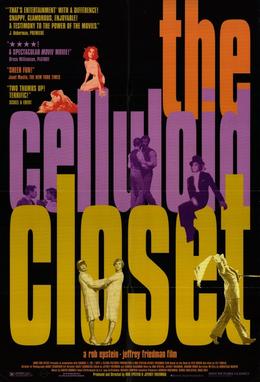
The Celluloid Closet is a 1996 American documentary film directed and co-written by Rob Epstein and Jeffrey Friedman, and executive produced by Howard Rosenman. The film is based on Vito Russo's 1981 book The Celluloid Closet: Homosexuality in the Movies, and on lecture and film clip presentations he gave from 1972 to 1982. Russo had researched the history of how motion pictures, especially Hollywood films, had portrayed gay, lesbian, bisexual, and transgender characters.
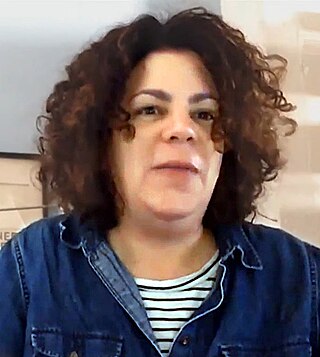
Rose Troche is an American film and television director, television producer, and screenwriter.

RFD is a reader-written quarterly magazine celebrating queer diversity. Since its founding in 1974 as a publication for rural gays and alternative lifestyles, the magazine has been edited by different communities in various U.S. locations. While predating the Radical Faeries, the magazine and the movement have long been associated. Notable writers featured in RFD include the poet Essex Hemphill.
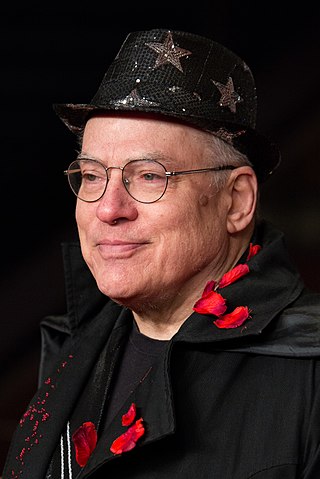
Holger Bernhard Bruno Mischwitzky, known professionally as Rosa von Praunheim, is a German film director, author, producer, professor of directing and one of the most influential and famous queer activists in the German-speaking world. A pioneer of Queer Cinema and gay activist from the very beginning, von Praunheim was a key co-founder of the modern lesbian and gay movement in West Germany and Switzerland. He was an early advocate of AIDS awareness and safer sex. His films center on queer-related themes and strong female characters, are characterized by excess and employ a campy style. They have featured such personalities as Keith Haring, Larry Kramer, Diamanda Galás, William S. Burroughs, Allen Ginsberg, Judith Malina, Jeff Stryker, Jayne County, Divine, Charlotte von Mahlsdorf and a row of Warhol superstars. In over 50 years, von Praunheim has made more than 150 films. His works influenced the development of LGBTQ+ movements worldwide.

Rise Above: The Tribe 8 Documentary is a feature film about the all women queercore punk band Tribe 8 directed and produced by Tracy Flannigan.

Arthur J. Bressan Jr. was an American director, writer, producer, documentarian and gay pornographer, best known for pioneering independent queer cinema in the United States during the 1970s and 1980s. He wrote and directed the 1985 feature film Buddies, which was the first American film to grapple with the subject of the AIDS pandemic. Other directorial endeavors include the largely influential 1977 documentary Gay USA, and the 1983 feature film Abuse. He died on July 29, 1987, at the age of 44 due to an AIDS-related illness.

Jochen Hick is a German film director and producer of mainly independent feature and documentary films, also specialising in LGBT subjects. In 1994 he founded the film and TV production company GALERIA ALASKA PRODUCTIONS, based in Hamburg and Berlin. He worked and produced for several production companies and TV channels and contributed to TV documentary programs such as ARD-Exclusiv or SPIEGEL TV Reportage. 2007-2010 he is as well editor-in-chief, head of program acquisitions and co-programming director of TIMM, the first TV channel for gay male audiences in German speaking countries, which has been on the air since November 1, 2008.
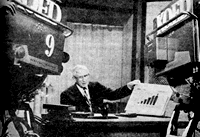
The Rejected is a made-for-television documentary film about homosexuality, produced for KQED in San Francisco by John W. Reavis. Notable as the first documentary program on homosexuality broadcast on American television, KQED first aired the film on September 11, 1961. Later syndicated to National Educational Television (NET) stations across the United States, it received positive critical reviews.
LGBTQ media or gay media refers to media whose primary target audience is members of the LGBTQ community. Secondary targets are LGBTQ+ allies, and in some instances those who oppose gay rights may be targeted as a form of activism. Gay or queer media can also be defined as web sites, films, magazines and other cultural products that were created by queer individuals, or groups that are typically out, meaning that they are public or open about their identity. LGBTQ creators do not always include LGBTQ themes or issues in the media that they produce, but there are often at least subtle references to queerness in these media.
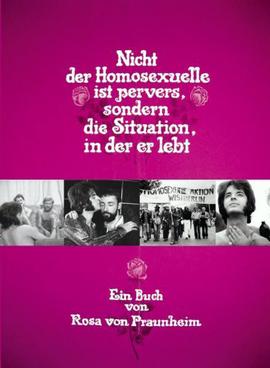
It Is Not the Homosexual Who Is Perverse, But the Society in Which He Lives is a 1971 West German avant-garde film directed by Rosa von Praunheim.

The German Democratic Republic, or GDR, a state in Central Europe that existed from 1949 to 1990 before being absorbed by the Federal Republic of Germany (FRG), was dominated by heterosexual norms. However, East Germany decriminalised homosexuality during the 1960s, followed by increasing social acceptance and visibility.
References
- 1 2 "Talk Straight: The World of Rural Queers" – via mubi.com.
- 1 2 "Talk Straight - the World of German Queers" . Retrieved 17 June 2022.
- ↑ Harvey, Dennis (March 7, 2004). "Talk Straight: The World of Rural Queers".